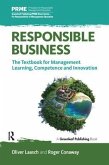Corporate sustainability, now regarded as a vitally important topic on the agenda for businesses, has in recent years not only become embedded in postgraduate study, but is now also widely taught at the undergraduate level in business schools. Corporate Sustainability Leadership reflects the growing need for an accessible text at all levels of study. The book brings the topic of corporate sustainability fully up to date by incorporating new directions in the areas of corporate responsibility and sustainability.
Written by the authors of the highly successful Understanding Business Ethics, this book provides a primary resource for any undergraduate or graduate corporate sustainability class. Unlike other textbooks in corporate sustainability, which are often edited collections from multiple authors, this book develops themes throughout each chapter using a consistent voice to ensure an integrative learning experience for both students and instructors. With ten chapters and ten cases, all of which are supplemented with online test banks, instructor guides, and PowerPoint slides, this textbook provides enough content for a complete class on corporate sustainability.
Using stakeholder theory as a foundation, Corporate Sustainability Leadership allows readers to develop a better understanding of how organizations can effectively satisfy the needs of their critical stakeholders. It addresses the issues of corporate sustainability from both a micro and macro perspective. Micro issues related to corporate sustainability include leadership, organizational change, management decision making, human resource organizational strategies, organizational ethics, organizational culture, corporate sustainability reporting, corporate sustainability performance, and corporate compliance. The macro issues addressed include suppliers, corporate sustainability communications, consumers, the natural environment, governments, NGOs, and the developing world. In addition, there are ten unique company cases from organizations that are household names, such as Bayer, Shell, Volkswagen, and Dow Chemical.
Written by the authors of the highly successful Understanding Business Ethics, this book provides a primary resource for any undergraduate or graduate corporate sustainability class. Unlike other textbooks in corporate sustainability, which are often edited collections from multiple authors, this book develops themes throughout each chapter using a consistent voice to ensure an integrative learning experience for both students and instructors. With ten chapters and ten cases, all of which are supplemented with online test banks, instructor guides, and PowerPoint slides, this textbook provides enough content for a complete class on corporate sustainability.
Using stakeholder theory as a foundation, Corporate Sustainability Leadership allows readers to develop a better understanding of how organizations can effectively satisfy the needs of their critical stakeholders. It addresses the issues of corporate sustainability from both a micro and macro perspective. Micro issues related to corporate sustainability include leadership, organizational change, management decision making, human resource organizational strategies, organizational ethics, organizational culture, corporate sustainability reporting, corporate sustainability performance, and corporate compliance. The macro issues addressed include suppliers, corporate sustainability communications, consumers, the natural environment, governments, NGOs, and the developing world. In addition, there are ten unique company cases from organizations that are household names, such as Bayer, Shell, Volkswagen, and Dow Chemical.
"In their latest work, Corporate Sustainability Leadership, Drs. Peter and Sarah Stanwick have crafted an exceptionally well researched, well written and relatable guide that will be an enormous benefit for professors and their students. Drs. Peter and Sarah Stanwick have gone much deeper into concepts and topics such as corporate leadership, stakeholder relationship and ethical considerations than is typical for a more general business textbook. For any student, any professor, any scholar of corporate leadership, this textbook will provide a depth and breadth of information." - Scott Kenneth Campbell, PhD








